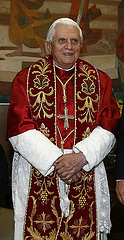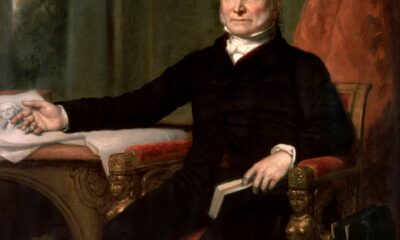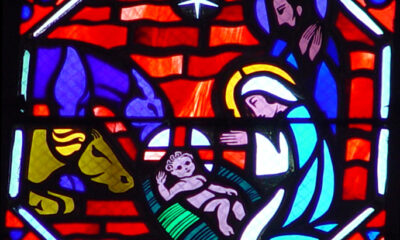Ignite the Pulpit
Benedict XVI Resigns

Pope Benedict XVI said today (per the BBC) he would resign his office, effective February 28. He is the first Pope to resign in almost six hundred years.
Career of Benedict XVI
Joseph Cardinal Ratzinger became Pope almost eight years ago, at the age of 78. He is the oldest person to take that office since Clement XII in 1730.
He chose the name Benedict to honor Benedict of Nursia, famous for his Rule for Monks and the order that bears his name. Benedict XVI propounded a conservative religious and political philosophy, as Pope and earlier as Archbishop of Munich. He also at least tried to offer peace with leaders of other religious systems. These included Judaism and Islam, but not everything he said about those religions pleased all their leaders and adherents.
Malachy of Armagh (see below) called him “Glory of the Olive.” That could refer to the olive branch. (Noah’s dove brought an olive branch back to his grounded Ark. Since then, men have looked on the olive branch as a symbol of a peace offering.) It could also refer to:
- The Olivetan order, to which Benedict of Nursia actually belonged.
- The Mount of Olives in Jerusalem, where Jesus Christ gave His disciples the “signs of the end of the age.” (Matthew chh. 24-25; Luke ch. 21.)
How many Popes have resigned before?
Popes rarely resign. Ironically the first Pope that all agree did resign was Benedict IX. He had brought the Church to scandal. So the future Gregory VI asked Benedict how much he could pay him to get lost, and then paid him. But that only scandalized the Cardinals further. Gregory VI resigned himself a year later.
The last pope to resign before Benedict XVI was another Gregory, Gregory VII. He resigned during the Great Western Schism. He was one of three rivals who each claimed the Papal title. Gregory knew he was losing the support of the College of Cardinals. He resigned, then retired into private life for two years. The College waited that long to choose another Pope.
Benedict XVI set a precedent today. He is the first Pope to resign on his own on account of failing health. He literally said he could no longer in good conscience hold the job if he was not strong enough to do the job. One could argue that the job of Pope is more stressful than ever. Pope John Paul II, who preceded Benedict XVI in office, became the best-traveled Pope in the world. The stress told on him, and many wondered why he didn’t resign. Many who knew Benedict XVI take him at his word. He watched John Paul II decline in health, and saw what that did to the Church. And he vowed never to put himself or the Church through any such ordeal. He even said years ago: when a Pope can’t handle the job, it’s time for him to go. And now he is taking his own advice.
By his own statement, his job will fall vacant on February 28, at “20:00 hours.” That could mean 8:00 p.m. Western European Time (which is UTC +1), or 19:00 hours Coordinated Universal Time.
The Independent (United Kingdom) used the phrase “outbreak of modernity” in their own report on Benedict XVI’s announcement. That could mean only that Benedict XVI broke the tradition of Popes dying in office no matter whether they could do the job or not. Or it could mean that some hope the next Pope will reverse some of the conservative things Benedict XVI did during his term.
A matter of prophecy
But that second hope might be wishful thinking. Obviously no one has named a successor yet, nor do Popes do that sort of thing. (Or at least, not anymore.) But at least one prophet, who wrote centuries ago, said then the next pope after Benedict would be a tyrant. Furthermore, he said the next pope would be the last.
Malachy of Armagh (1094 – 2 November 1148) was the first man from Ireland whom the Church recognized as a “saint.” (See Bernard of Clairvaux’ biography of him here.) In 1139 Malachy traveled to Rome to make a report to then-Pope Innocent II. While there, so the story goes, he saw a vision of 112 popes who would come after him. The list begins with Pope Celestine II (Innocent’s successor, chosen in 1143). It ends with this baleful sentence:
In persecutione extrema S.R.E. sedebit Petrus Romanus, qui pascet oues in multis tribulationibus: quibus transactis ciuitas septicollis diruetur, & Iudex tremêdus iudicabit populum suum. Finis.
Or in English:
In extreme persecution, the seat of the Holy Roman Church will be occupied by Peter the Roman [or simply “The Roman Rock”], who will feed the sheep through many tribulations. After this, the city of seven hills will be destroyed, and the formidable Judge will judge his people. The End.
No Pope has ever presumed to take the name of Peter.
Malachy lists 111 Latin phrases. Each describes a particular Pope in the line from Celestine on. It also lists the Antipopes of the Great Western Schism. Those phrases have never failed, from that day to this. (See also this list of the Malachy phrases.)
Naturally the most recent Popes are the most relevant. This page lists the last five; this the last ten. As those pages show, Malachy pithily described these most recent Popes with uncanny accuracy. Only men like Isaiah, Jeremiah, Ezekiel, and Daniel have done better at telling the future ahead of time.
Some who interpret Malachy’s phrases assumed that the 111th Pope would also be “The Roman Rock,” or “Peter the Roman.” But others expected Benedict XVI to die quickly in office to make way for this “Rock.” Probably no one expected Benedict to step down on his own!
This separate commentary talks about how some influence, or group, will destroy Rome. In fact it identifies “Mystery Babylon” with Rome, not with the ruined city that Saddam Hussein tried to restore.
Thomas Horn and Cris Putnam (Petrus Romanus: The Final Pope is Here) said last year they expected Benedict XVI to be dead or out of office by the end of 2012, and the “Roman Rock” to be Pope in his place. Horn and Putnam also mention a Jewish mystical work: the Zohar. That work also mentions conditions that seem to be fulfilling themselves this year, said Horn in a video interview. (See below.)
A commenter on the video tartly observed yesterday,
Well it’s 2013 so all their predictions were wrong. How about everyone focus on trying to get their souls right for the Lord Jesus Christ instead of trying to predict when the anti-christ will come. God didn’t let us know so we just all need to leave it at that.
At last viewing, that user has not reacted yet to hearing that Benedict XVI is resigning, and that the way is now clear, or soon will be.
Once is happenstance, twice is coincidence, and the third time, it’s enemy action. (Ian Fleming)
ARVE error: need id and provider
ARVE error: need id and provider
[subscribe2]
Terry A. Hurlbut has been a student of politics, philosophy, and science for more than 35 years. He is a graduate of Yale College and has served as a physician-level laboratory administrator in a 250-bed community hospital. He also is a serious student of the Bible, is conversant in its two primary original languages, and has followed the creation-science movement closely since 1993.
-

 Civilization3 days ago
Civilization3 days agoWhy Europe Shouldn’t Be Upset at Trump’s Venezuelan Actions
-

 Executive4 days ago
Executive4 days agoHow Relaxed COVID-Era Rules Fueled Minnesota’s Biggest Scam
-

 Constitution5 days ago
Constitution5 days agoTrump, Canada, and the Constitutional Problem Beneath the Bridge
-

 Christianity Today3 days ago
Christianity Today3 days agoSurprising Revival: Gen Z Men & Highly Educated Lead Return to Religion
-

 Civilization4 days ago
Civilization4 days agoThe End of Purple States and Competitive Districts
-

 Executive3 days ago
Executive3 days agoWaste of the Day: Can You Hear Me Now?
-

 Executive4 days ago
Executive4 days agoWaste of the Day: States Spent Welfare in “Crazy Ways”
-

 Guest Columns5 days ago
Guest Columns5 days agoWhy We Need Lent















[…] Benedict XVI resigns […]